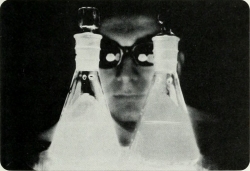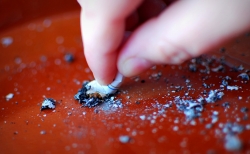The moon is made of cheese. If I told you this, you might laugh and say I was wrong. But, if you were a scientist, you would ask for proof.
Empirical evidence is information gained by using your five senses or by doing tests. Everything in science can be seen by many or repeated again and again. We can use these facts to guess what else could be true based on what we already know or have just found out. Let's see how this works.

Skydiving is a great way to test gravity. You should probably try it in different parts of the world to replicate the experiment too!
RepetitionStrong evidence isn't something that can be gathered by just one test, or even a few people running the same test and seeing the same thing. It needs to be replicable.
Replicable means that a test can be done over and over to prove the same thing each time. Gravity is proven by dropping any object from any height on Earth and watching it fall to the floor. This happens every single time. Go ahead and drop your pen on the floor. I bet you in no time at all you'll see and hear it hit the floor. This test is replicable. You can do it again and again and every time you will see gravity at work.

Multiple trials in an experiment help to check for errors in results, but they don't guarantee the conclusion is valid.
When tests are repeated by the same scientists, they are running many
trials. Trials are the many repeated tests to prove the same thing. This is important so the scientist makes sure they are getting the same information after each test. This is very important for medicine. Before we know that a new medicine is safe to use, it needs to be tested in many trials to make sure it both works and is safe for people to use.
When a person or team runs many trials, they are using
repetition. That is to say, they are redoing the same thing, over and over. It is an important step to make sure that you get the same outcome each time. However, it is different than other people repeating your study because they might do your test little differently. Both types of repetition are important though. Studies that are repeated over and over again are more trusted than those that aren't.

Studies that look at changing climate and ocean acidification need to be replicated by different scientists at different times to ensure results are the same.
NASA Goddard Space Flight Center from Greenbelt, MD, USA, Public domain, via Wikimedia Commons
InferencesAn
inference is what you decide is true based on logic and what you have already observed using your five senses. Here is what I mean: "I have seen two blue birds fly into and out of the same tree several times today, so I can infer that there is a nest in there." This is different than a guess, so don't mix these two up. A guess would be "I think there are five babies in the tree." This is not based on any facts, so it is a guess, not an inference.

It's easy to infer that this isn't the first cigarette this person has ever smoked because many people who are addicted to cigarettes smoke many cigarettes.
With the scientific method, a hypothesis is a guess about what will happen during your tests. This is done before the tests even starts, which is different than an inference. An inference is also different from a hypothesis because we only use it when things are too far away or a test would take too long. We would use what we know to make our inference. Here's one case: If we want to make an inference about when the sun will die, we need to look at other stars in the sky that have died before making a guess. Because we used facts and what we can see, this is an inference.
References
Content adapted by the RocketLit team from:
OpenStax CNX. Biology. "2.1 Atoms, Isotopes, Ions, and Molecules: The Building Blocks." cnx.org, 2017.